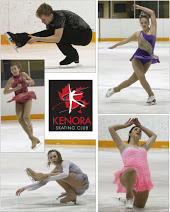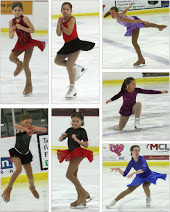Like our Facebook Page & Follow us on Instagram Seasonal Program
Kenora Skating Academy FALL - September / WINTER -October - April
@kenoraskatingacademy SUMMER - July - August
Top Content Title
This is an additional section to be able to add content


STARSkate 1-5 Program:
STAR 1-5
Led by NCCP-certified Skate Canada coaches, the STAR 1-5 curriculum is Canada’s premier figure skating program. It lays the groundwork for future champions in singles, pairs, ice dance, and synchronized skating by introducing participants to all the figure skating essentials.
We welcome skaters of all ages, including adaptive skaters who have met the required skill development level. All students must have completed CanSkate Stage 6 or an equivalent to enroll.
STARSkate 6 - Gold Program
STAR 6-Gold
is an assessment and event framework program designed for skaters who have completed the STAR 1-5 curriculum. It pushes your skills to the next level, building on what you’ve already learned while introducing exciting advanced figure skating elements.
Disciplines
Our figure skating program features the following pathways to develop your full potential:
Skills: A discipline for assessments that allows skaters to explore turns, steps, field moves and more. Skills is the foundation to all other disciplines.
Singles (Freeskate): Single skating is where individual creativity shines through in the art of freeskate. It’s the most recognized form of our sport, showcasing personal style and athleticism on the ice.
Pairs: Two skaters join forces here to create a mesmerizing display of teamwork and skill. From lifts to throws, this discipline combines the beauty of technical ability and collaboration.
Ice Dance: Inspired by ballroom dancing, ice dance blends rhythm, athleticism and elegance, allowing skaters to express themselves through captivating performances set to some of your favourite songs.
Synchronized: Synchronized skating, or “synchro,” is a dynamic team discipline where groups of eight or more skaters move as one, executing beautifully fluid circles, blocks, lines, wheels and intersections to music. Open to all ages and skill levels, it celebrates unity and teamwork on and off the ice.
Artistic: This discipline allows skaters to show their artistry through movement, creativity, projection, and musicality.
STAR 1-5 Philosophies:
Skaters are encouraged to move through the assessments at their own rate. Coaches and skaters no longer have to wait for test days or adjust their training plans to accommodate dates for testing as coaches will be assessing this program. Coaches can spend time on training, development and skill acquisition and assess the skaters when ready. For many clubs this will open up huge opportunities for growth and progression as acquiring officials on a regular basis is a difficult task (due to availability) and can be very costly in remote areas.
The STAR 1-5 program is designed to encourage skaters and coaches to strive for the highest quality of skill execution and acquisition. A strong foundation at this level will enable skaters to progress more quickly in the higher levels of figure skating and be ready for the next level of skills. This philosophy is reinforced by encouraging skaters to achieve the “Pass with Honours” designation on their assessments, as well as achieving “Gold” status on their performances at events.
As in CanSkate, many skills in the STAR 1-5 program will be introduced early to allow coaches to work with skaters on developing these skills over time. Many skills in skating are complex. Introducing these skills early will enable coaches to hone and develop the skaters’ technique over time. This will allow the skaters to have sufficient practice of the skill before it is required in our sport. Be mindful that many of these skills are not expected to be performed at an advanced level, but rather at a level that is in development.
The entry level of STAR 1 is designed to meet the exit level of Stage 6 in CanSkate. It is imperative that all skaters beginning STAR 1 have the skills of Stages 5 and 6 in CanSkate. STAR 1 Skills and STAR 1 Freeskate are designed to be achieved within three to nine months of exiting CanSkate. The remainder of the STAR 1-5 program is designed to assist the skater’s development in a progressive manner. Skaters may move through the STAR program at their own pace per discipline. For example: A skater may be working on STAR 3 Skills, STAR 1 Dance and STAR 2 Freeskate.
|
Why Coach Assessed Tests? Assessment in the STAR 1 -5 program will be performed by the coach who is teaching the skater the discipline that is being assessed. There are many reasons why coaches will be assessing their skaters: - Clears the pathway for development by removing time and logistic barriers. Skaters will have access to assessment opportunities as they are ready and their development progresses. Without the demands of readiness following a pre-set test day calendar, the skaters are free to move through the program at their own rate without obstacles. STAR 1-4 assessments are designed to be available to the skaters on their regular session and during their normal time slot, thus allowing the assessments to be convenient and free of additional ice or travel costs. - Opens up equal opportunity to all skaters regardless of location in Canada. Being able to use the club coach to perform assessments enables all skaters in every region of Canada to have the opportunity to be assessed when ready. This eliminates the geographical advantage or disadvantage due toavailability of officials. During the “Learn to Train” stage of development, the ability to move through the program when ready is a critical component of maximizing skill progression. - Allows coaches to be 100% accountable for skater development. Coaches will have total command over skater development from CanSkate to double jumps. This opportunity is advantageous in ensuring skater development quality is consistently monitored, nurtured and encouraged. - Costs to the skater is reduced. The STAR 1-4 assessments can be taken at any time during the year on the session they are skating. STAR 5 assessments for the pattern dances and freeskate programs, must be skated on clear ice. This can be done on a session that has been cleared (Freeskate program or dance pattern), or can be scheduled on a separate session. |
|
For the level: - Every skater will go through early, moderate and advanced stages of development for each skill and area of technique. The STAR 1-5 program allows skaters to be rewarded for being on the pathway of development at each stage. A STAR 1 skater will be at the early stages of development in all areas, therefore the assessment standards will reflect an “early stage” performance. The new assessment standards will reflect a satisfactory or good performance “for the level” regardless of the stage of development. |
Bottom Content Title
This is an additional section to be able to add content
